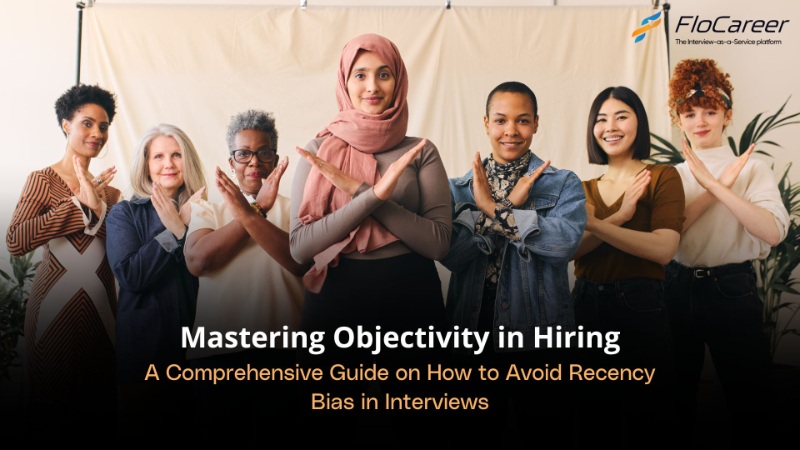A Comprehensive Guide on How to Avoid Recency Bias in Interviews: Mastering Objectivity in Hiring
In the dynamic world of hiring, ensuring fair assessments of candidates is paramount. However, cognitive biases, such as recency bias, can inadvertently affect our decision-making during interviews. In this blog, we'll explore the concept of recency bias, its impact on interviews, and unveil strategies to conduct unbiased interviews. Let's delve into how you can make objective decisions by using structured interviews, evaluation criteria, and prioritizing diversity and inclusion in your hiring process.

Understanding Recency Bias and Its Impact:
Recency bias, a common cognitive bias, refers to the tendency to give undue importance to recent information or experiences when making judgments or decisions. In the context of interviews, this bias can lead interviewers to disproportionately weigh a candidate's most recent job or accomplishment, potentially overshadowing a holistic assessment of their qualifications and experiences. Recognizing and addressing recency bias is crucial to ensuring fair and unbiased hiring decisions.
Strategies for Avoiding Recency Bias:
Implement a Clear-Cut System:
Establishing a systematic and well-implemented interview process is foundational to overcoming recency bias. Start by developing a clear set of interview questions, ensuring that each candidate experiences the same level playing field. Creating a rating criteria for each response helps in overcoming recency bias, as your notes become an integral part of the assessment process.
Record Interviews:
With the candidate's consent, recording interviews provides a valuable resource for reference when narrowing down the pool of candidates. By revisiting clips, you can mitigate the impact of recency bias and ensure a more comprehensive evaluation. Consider leveraging FloCareer's Interview Intelligence for efficient recording and reviewing processes.
Avoid Decisions During Fatigue:
Mental fatigue exacerbates the recency effect, making it crucial to avoid decision-making during states of tiredness. Opt for scheduling candidate evaluations during the morning when you're fresh and alert. Taking breaks between interviews allows for mental rejuvenation, preventing the harmful effects of recency bias and facilitating a more accurate assessment.
Rigorous Note-Taking:
Rather than scheduling back-to-back interviews, allocate sufficient time between candidates for reflection and note-taking. Capture impressions immediately while the candidate's experience is still fresh in your mind. This approach enhances your ability to reflect on notes and remember candidates' strengths and weaknesses, reducing the impact of recency bias.
Provide Interviewer Training:
To foster fair interviews, invest in comprehensive interviewer training. Educate interviewers on recognizing and avoiding all types of biases, not just recency bias. Emphasize the importance of keeping an open mind, assessing candidates based on merit and qualifications, and conducting interviews without subconscious biases.
Randomize Candidate Reviews:
Review candidate responses question by question instead of candidate by candidate. Distribute candidates randomly to be reviewed in a different order, preventing any applicant from benefitting from a specific review sequence. Randomize interview schedules to avoid groupthink and minimize the impact of recency bias.
Incorporate Multiple Perspectives:
Include multiple interviewers to provide diverse perspectives. This collaborative approach diminishes the influence of individual biases, fostering a more objective assessment.
Utilize Behavioral Interviews:
Structure interviews to focus on behavioral questions that assess a candidate's past experiences and actions. This approach provides a more comprehensive understanding of a candidate's capabilities beyond recent achievements.
Implement Blind Resume Screening:
Remove candidate names and other identifying information during the initial resume screening process. This ensures that the evaluation is based solely on qualifications and experience, reducing the likelihood of recency bias based on a candidate's name or recent positions.
Establish Evaluation Consistency Across Panels:
Ensure consistency in evaluation criteria across all interview panels within the organization. This approach prevents variations in assessment standards and helps counteract the potential impact of recency bias across different stages of the hiring process.
Primacy Bias vs. Recency Bias: Understanding the Impact:
Both primacy and recency biases significantly influence decision-making during interviews. Primacy bias focuses on the initial information shaping judgments, while recency bias gives undue weight to recent information. These biases can lead to incomplete assessments, affecting the overall decision-making process. Awareness and active consideration of all available information are crucial in mitigating these biases.
How FloCareer Interview as a Service Mitigates Bias:
FloCareer's Interview Intelligence plays a crucial role in promoting an unbiased interview process. By offering efficient recording and reviewing capabilities, it allows interviewers to revisit clips and make assessments based on the entirety of a candidate's performance. The platform's structured approach ensures consistency, mitigating biases like recency bias and contributing to fair and informed hiring decisions.
In conclusion, understanding and combating recency bias in interviews is essential for making objective and unbiased hiring decisions. By implementing the strategies outlined above, you can create a fair and comprehensive interview process. As you strive for better decision-making, consider leveraging FloCareer's Interview Intelligence to enhance your recording and reviewing capabilities, ensuring every candidate receives a fair opportunity, free from the impact of recency bias. This commitment to fairness ultimately leads to better decisions, better processes, and better recruitment outcomes.
Check out our latest blog on conducting leadership interviews


